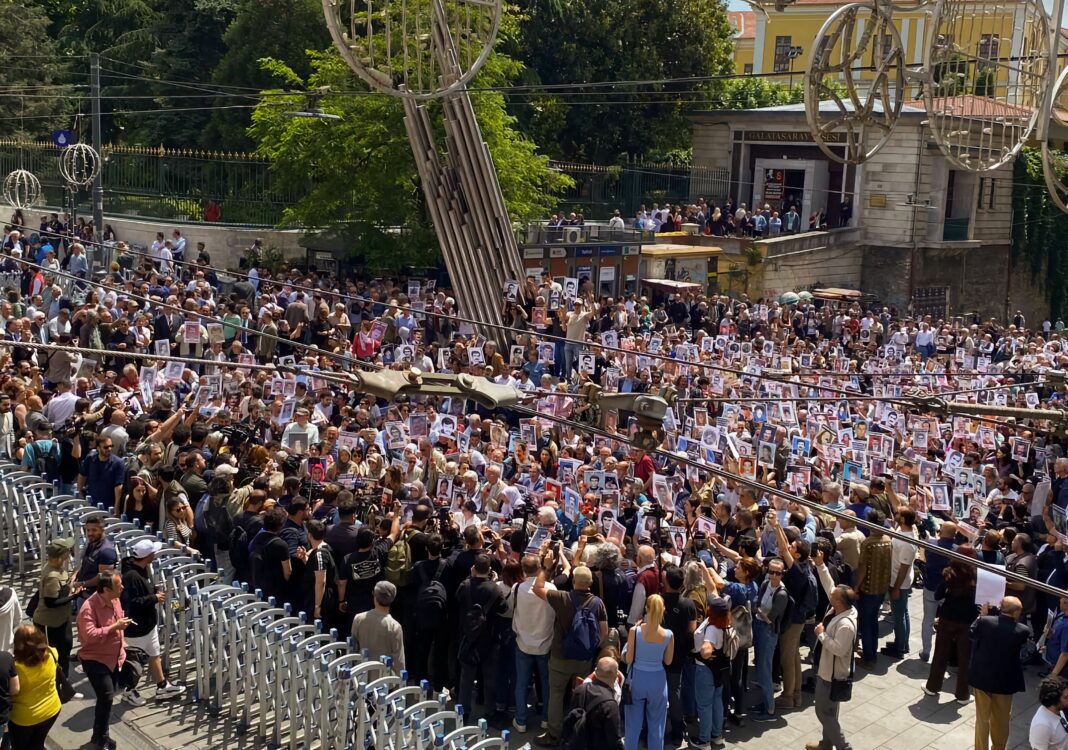The Saturday Mothers, a group of activists and relatives seeking the fate of loved ones who disappeared in police custody in Turkey, held their 1,000th vigil today, marking the longest-running protest in the country’s history since they first gathered on May 27, 1995, in Galatasaray Square on İstanbul’s İstiklal Street.
The 1,000th vigil saw the participation of thousands of supporters, including politicians and civil society organizations.
This milestone event occurred after police lifted a 300-week-long ban, preventing them from meeting in Galatasaray Square.
The Saturday Mothers have been gathering every week to demand justice for their disappeared loved ones and to hold the responsible parties accountable.
Maside Ocak, one of the Saturday Mothers, expressed a deep emotional connection to the protest site, saying, “This place holds our memories. It’s where the relatives of the disappeared meet.”
.@amnesty stands in solidarity with the Saturday Mothers/People
movement in Istanbul for the 1000th vigil for truth and justice for their loved ones who were subjected to enforced disappearances and killings in the 1980s and 1990s pic.twitter.com/0wz2gw1TsQ
— Agnes Callamard (@AgnesCallamard) May 25, 2024
Gülseren Yoleri, head of the İstanbul branch of the Human Rights Association, condemned the ban and reiterated the group’s commitment to seeking justice. “The ban, which lasted for 300 weeks, was unjust and illegal. Our quest for justice will continue. We want the 1,001st week to be [without a ban] as well,” Yoleri stated.
During the 1,000th vigil, the Saturday Mothers released a statement reflecting their decades-long struggle: “Today, we gather here for the 1,000th time with the same deep pain and determination. 1,000 weeks… 7,000 days, 229 months… A lifetime spent searching. We are the Saturday Mothers and People. We are mothers, fathers, spouses, siblings, children, nieces and grandchildren. We are like you, but we have a deep wound in our hearts from not even having the graves of our loved ones.
“For 1,000 weeks, we have asked: Where are our disappeared [relatives]? For 1,000 weeks, we have demanded: Why are those responsible for these crimes against humanity protected with impunity? We will not forget, we will never forget. We will not give up, we will never give up. Since May 27, 1995, we have gathered every week at 12:00 in Galatasaray Square. This square has been the voice of us and our disappeared.”
The vigil also highlighted the ongoing impact of enforced disappearances on families. Many relatives have passed away without knowing the fate of their loved ones. The family of Cemil Kırbayır, who disappeared following the 1980 military coup, has been searching for answers for 44 years. His sister, Fatma Kırbayır, recently passed away without finding out what happened to him.
The Saturday Mothers emphasized their continued commitment to their cause, saying, “We cannot touch our loved ones who were disappeared under custody, but every Saturday, we proudly carry their photos. We leave a carnation for them in Galatasaray Square. This tradition will continue from generation to generation. Every eye that looks at Galatasaray Square, every stone in that square, is a witness to the state’s great shame and the resistance of the Saturday Mothers.”
Despite past police violence and legal obstacles, the Saturday Mothers remain resolute. They demand the government provide information on the whereabouts of their loved ones and hold those responsible accountable. The group declared, “In our 1,000th week, we come before the public with a single demand: We want our [loved ones who] disappeared. We want to place our carnations not in Galatasaray, but on the real graves of our loved ones. Until we find them, we will not give up.”
During the 1980s and ’90s, many people “disappeared” in Turkey’s predominantly Kurdish areas. The practice had been long gone until it reappeared in the wake of an attempted coup against Turkish President Recep Tayyip Erdoğan that claimed the lives of 251 people on July 15, 2016.
Dozens of enforced disappearances have been reported in Turkey since the abortive putsch, with more than 20 of the victims reporting, after they were found, that they were subjected to torture during the time they were “missing.”
The victims of those enforced disappearance cases were mostly alleged followers of the Gülen movement, which is inspired by the US-based Muslim cleric Fethullah Gülen and targeted by the president since the corruption investigations of December 17-25, 2013, which implicated then-prime minister Erdoğan, his family members and his inner circle.
Erdoğan’s Justice and Development Party (AKP) government also labels the faith-based group as a terrorist organization and accuses them of masterminding the attempted coup, despite both Gülen and his followers’ strong denial of involvement in the abortive putsch or in any terrorist activities.


